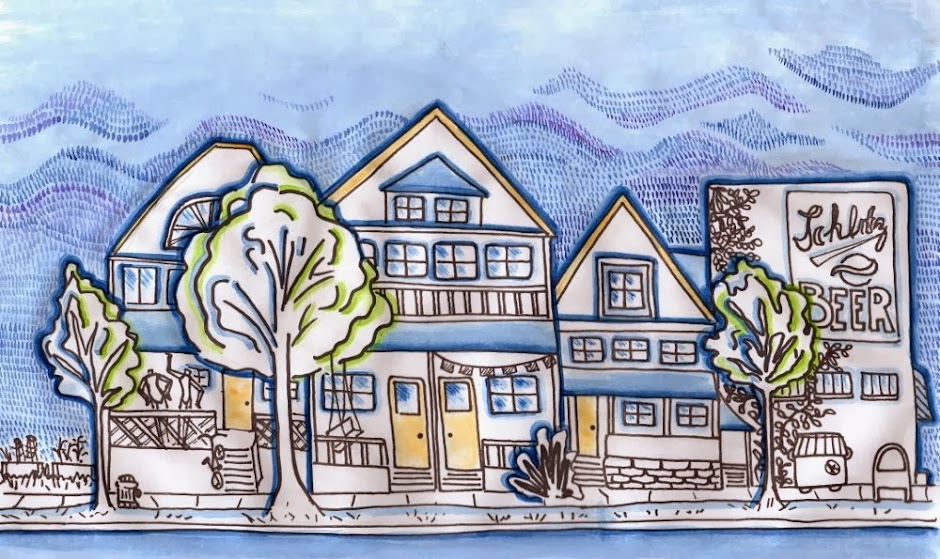My educator manifesto is a reflective one. It’s personal,
actually. When I initially sat down to write this manifesto (2 weeks ago), I
wrote down two statements:
1.
That I believe in the potential of all students.
2.
That I believe that teaching is the primary way
to work for justice and equality.
And both of those statements are true. But the deeper I
reflected, the more I began to think critically about my role as an ISE
specialist at Rocketship.
--
I was the first born in a set of triplets. I’m older than my
brother Jared by 2 minutes and older than Jonathan by 4.
We were small and underweight (as all multiples are), so we
had to spend time in incubators. The doctors and nurses used color-coded onsies
and bedding sheets to tell us apart. From birth, we were treated as a unit.
Strangers and family alike would refer to us as “the boys” or the “Ault
brothers”, or in reference to an individual, “one of the kids.”
Worst of all, sometimes we would be differentiated by a
physical feature or a specific character trait: “Get the Ault kid with the
curly hair.” Or “Jonathan, he is the smart one.”
As for me, I was deemed “the quiet one”—as if my adolescent
shyness was the only defining feature
of my character and my intricate person hood.
I hated this. I hated being a part of a whole. I hated the
fact that people refused or had an inability to see me as an individual with
all my complexity, likes and dislikes, struggles, and joys. I recognized this
from an early age.
When we would go out to eat, I would sit at a different
table.
When we would play organized sports, I refused to play on
the same team.
When my parents attempted to dress us up in like clothing, I
threw epic tantrums.
I was very, very stubborn.
--
One of the only places where I felt treated as an individual
was in school. But it wasn’t because the teachers recognized my need for
independence.
It was because at the age of 5, I was determined to have a
learning disability.
It was hard news for my parents and became a very
complicated issue for the school district. Holding back a child is always a
decision fraught with potential conflicts and tough conversations, but holding
back a child that is a triplet is even more nuanced:
1.
What would this do to my confidence as a I aged?
2.
How would I be perceived by my brothers?
3.
How would I be able to explain that I’m a
triplet, the same age of my brothers, but two grades behind?
My parents and a few of my teachers recognized that holding me
back (for two years) would be a devastating decision, especially when I got to
high school and middle school.
So, the Special Ed teacher and the reading specialist went
to work.
They provided student tutors from local universities to meet
with me after school—my indelible memory is when one of them purchased me my
own cactuses and succulent plants that I used to decorate my room.
I recall the yellow manipulatives that I had at my desk
during math lessons when I was in the general ed. class, and the pride I felt
at being unique.
I remember the praises for the small, but substantial
successes.
I remember the way in which my kindergarten teacher, Mrs.
Kilker, would lightly touch the bottom of my chin while working with me on
letter sounds. Her patience and care for me still illicit deep feelings of
gratitude almost 30 years later.
I remember my first grade teacher Mrs. Bennis who met with
my parents weekly to assess my progress and who protected me from getting held
back, working each and every day to assure them that I could succeed…
In the end, I was moved to a private school for 4 years,
where I had more one-to-one attention, while my brothers stayed in public
school. Their interventions worked.
--
In 2013, I graduated from Marquette University with a Master’s
Degree in Global History. At the end of the ceremony, my father asked to hold
my diploma – I was the first person in my extended family to achieve this level
of education.
He said he wanted to take it back to PGH. I asked him why.
He said he wanted to show Mrs. Kilker and Mrs. Bennis the fruits of their
labor.
Two teachers I had nearly 3 decades ago were the ones my dad
wanted to thank first.
And that’s the importance of Special Education.
It’s believing in students no matter the odds.
It’s the power of advocating for families.
It’s the power of an imagined future that isn’t built on
false hope, but one that is attainable.
